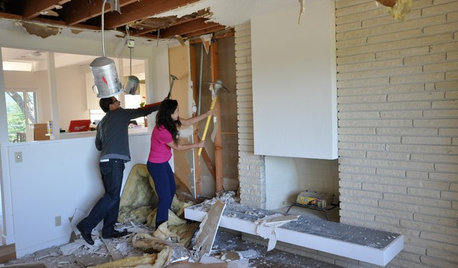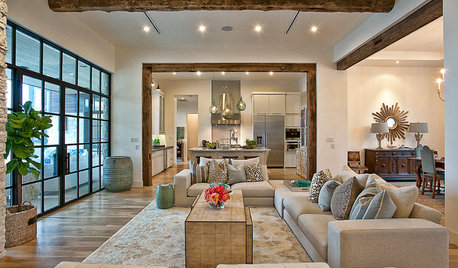Dr./patient relationships...
Annie Deighnaugh
3 years ago
Featured Answer
Sort by:Oldest
Comments (163)
olychick
3 years agojmm1837
3 years agoRelated Discussions
Dr.'s appointment
Comments (7)Oh Ms Vickie: Good Lord Have Mercy..... You could hang up a shingle and ..... start your own counseling service.... Just get a couch and You are set.................... That is Wild........... Just Plain W I L D !!!!! But you did good............. You kept your COOL ! ! ! Was this the 1st time you saw this Dr ? and is he your primary care DR ? **** REMEMBER always get a 2nd S E C O N D opinion to anything serious !!!!! Well.... I hope the test will come out good for you.... Keep me informed...... Sorry that that was kinda of a back wards... experience... or as we use to say in TEXAS>>>> Back A ** wards ................. ++++ Drink Lots of water... Take your vitamins and herbs... walk as much as possible & Try Not to be stressed out !!!! I'm praying with you & For you.... That You will get GRRRRREAT test results GOD IS WATCHING OVER YOU & Holding ((((((((((((YOU )))))))))))))))) In His ARMS !!! God Bless ! SusieSunshine (...See MoreDr Phil- 'Relationship Rescue' book- any use for you?
Comments (4)Em, I have not read the book but I commend you for taking a step in the right direction; dealing with your emotions is very tiring but it's essential for any kind of recovery or improvement in your life. I like Dr. Phil and how he gives tips on opening up and saying what you are feeling and what you want; good luck to you on your quest, may you find the hope you need to spark up your relationship....See MorePlease help relationship with young adult son
Comments (3)I once had an elderly relative who I would visit occasionally. We were not close. She was my grandfather's sister and I didn't meet her until I was in my 20s. Whenever I did see her she would make some comment about how long it had been since the last phone call/visit. It didn't make it fun to see her to be reminded that I had been remiss. I would lay off anything that is remotely guilt-trip-like including comments about broken dialing fingers, etc. They aren't amusing if the relationship is the least bit strained. Do drop the phone from your plan as scheduled. Give him another notice the day before that as of tomorrow the service will end. It only takes a day to get another phone. You may not have the number any longer, however! As for how he treats you and speaks to you. Be direct be clear. Not the same as a guilt trip. I have been through this with my kids. They are not permitted to snarl at me or ignore me or treat me like an ATM machine and short order cook. I have told them how this makes me feel. That it is hurtful. I once left my 12 year old daughter at a horse show (she had a ride home) after being given the bum's rush everytime I came over to where she was. I explained that I didn't like being treated like an annoyance unless she wanted money. Since she seemed too occupied with her friends to eat with me or talk to me, I was going home. I left in tears while she stood there crying and begging me to stay. She got it. Since then she has almost always been very thoughtful aobut my presence at one of her shows. One thing I learned as a mom and an employee and as a woman was how to say no. When I wore myself out trying to do everything for everyone (and nothing for myself) no one was happy or appreciative. Once I defined boundaries, said no if it was a burden or too costly or I was tired, my family and others became far more appreciative of those things I am willing and able to do. My children thank me for home cooked meals and trips to the mall or rides or having friends over. One thing to remember about saying no (calmly and quietly with no excuses) after everyone being used to you dropping and doing on demand is that they will be surprised and angry. Trust me, it will pass. In it's place will be new respect and appreciation. Really!...See MoreSingle Dads and Dating/Relationships
Comments (13)DrPax- I am one to always suggest sticking it out, but with this one I am reluctant to do so. I'll give you a bit of my background to explain my reason. My father was a single dad from when I was 8 and my sister 10. I ended up marrying a single father. My heart goes out to you in many ways. Here are my thoughts: 1. Looking back, my father was an emotional basket case for two years after my mother. He wasnt there for us, checked out emotionally and traveled as much as he could for work. So I give you immense props for being there for your children. Post-trauma is when you need your "available" parent the most, I speak from experience. 2. Take care of yourself. You are still a man and dads need some adult TLC too! My father took care of us, went through many nannies before finding the "right" one (thatÂs an entirely different story), and then he began going out. That took 2 years, and by then, my sister had become queen bee, i.e. very territorial. So by the time he began feeling up to dating again, no woman was ever good enough and she was a nightmare (IÂve always been more mild tempered on that front)! Our children see us only as parents, so they donÂt get that we need to go out too. So, take time for yourself and let them know that. You are always there for them, but you need to be there for yourself too and they need to know that. 3. Single fathers are a great but extremely delicate category of human beings if you ask me. My now husband was so famished for affection, was so eager to love, but was so overwhelmed by everything concerning his children. It took much patience on both his and my part to find a balance with his childrenÂs demands and both of our needs as a romantic couple. If I can compare it to anything, it was like dating long distance, where you want to be with the person all the time, but you just canÂt Maybe, because I saw it with my father, I was willing to wait. But I also knew that being patient would pay off because I knew that I had fallen for a great guy. 4. When I first started dating my now husband, I did so much research with books and websites, I talked to any bio and step parent I could, but nothing (and I mean NOTHING, not even the blended family I was born into) prepared me for the actual reality of marrying with children (and I have it really good compared to most). The odds are against us second timers; but I truly believe it can be done. But if youÂre not ready, youÂre just not ready. Hence, point number one with a corollary, take good care of yourself. With your last post, it really sounds like you know what you need/want. 5. The "friend" introduction made me giggle. My father did the same thing, and we ALL knew that his friend was a Friend. Family dates worked best for my husband and myself and all the children. We went bowling, out to dinner, to the movies, brought the dogs for walks and by the end of it, it was OK. I was DadÂs girlfriend, and that was that. I then went to the house, and once I hung out with the children without my husband (I was a mess by the end of it!). My father was and still is so reserved and stiff when it comes to emotional things, but I just wished he had been more open and honest with all of us kids (bio and none). I knew what was going on, but my sister suffered tremendously for the lack of communication. She still calls it dishonesty, but my father just didnÂt know how else to handle it. Can I condemn my father? Can I condemn my husband for wanting to take it REALLY slowly when I was ready to marry him the day I met him? No. I have much empathy for both as I do for you and really, any single parent out there. Your girlfriend sounds like a well-intentioned person, but if you arenÂt ready, you just arenÂt, and there is nothing to it other than that. If she is willing to take the time, then I wish you all the best, but maybe you need more time to get on your two feet, no?...See MoreElmer J Fudd
3 years agolast modified: 3 years agoElmer J Fudd
3 years agojmm1837
3 years agolucillle
3 years agoElmer J Fudd
3 years agolast modified: 3 years agoZalco/bring back Sophie!
3 years agolast modified: 3 years agoZalco/bring back Sophie!
3 years agojmm1837
3 years agojmm1837
3 years agoalthea_gw
3 years agoSpringroz
3 years agonickel_kg
3 years agolucillle
3 years agolast modified: 3 years agoAnnie Deighnaugh
3 years agolast modified: 3 years agoElmer J Fudd
3 years agolast modified: 3 years agonickel_kg
3 years agoisabellagracepan
3 years agoAnnie Deighnaugh
3 years agoZalco/bring back Sophie!
3 years agolast modified: 3 years agoElmer J Fudd
3 years agolast modified: 3 years agoZalco/bring back Sophie!
3 years agoElmer J Fudd
3 years agolucillle
3 years agonickel_kg
3 years agoAnnie Deighnaugh
3 years agomaifleur03
3 years agoAnnie Deighnaugh
3 years agoSandplum1
3 years agolast modified: 3 years agoAnnie Deighnaugh
3 years agolast modified: 3 years agomaifleur03
3 years agoAnnie Deighnaugh
3 years agoElmer J Fudd
3 years agolast modified: 3 years agoZalco/bring back Sophie!
3 years agolast modified: 3 years agomaifleur03
3 years agoElmer J Fudd
3 years agolast modified: 3 years agoElmer J Fudd
3 years agolast modified: 3 years agomaifleur03
3 years agojmm1837
3 years agoamicus
3 years agoolychick
3 years agolast modified: 3 years agoElmer J Fudd
3 years agolast modified: 3 years agoZalco/bring back Sophie!
3 years agoAnnie Deighnaugh
3 years agoAnnie Deighnaugh
3 years agoamicus
3 years agoElmer J Fudd
3 years ago
Related Stories

REMODELING GUIDESHow to Protect (Even Enhance!) Your Relationship While Renovating
No home improvement project is worth a broken heart. Keep your togetherness during a remodel with this wise advice
Full Story
WORKING WITH AN INTERIOR DESIGNER5 Qualities of a Happy Designer-Client Relationship
Cultivate trust, flexibility and more during a design project, and it could be the beginning of a beautiful alliance
Full Story
REMODELING GUIDESWisdom to Help Your Relationship Survive a Remodel
Spend less time patching up partnerships and more time spackling and sanding with this insight from a Houzz remodeling survey
Full Story
GARDENING GUIDESHow I Learned to Be an Imperfect Gardener
Letting go can lead to a deeper level of gardening and a richer relationship with the landscape. Here's how one nature lover did it
Full Story
HOUSEKEEPINGHow to Stop Fighting About Household Chores
If you are naturally tidy and your partner is on the messy side, it may be time to take relationship-saving action
Full Story
GARDENING AND LANDSCAPINGGarden Lessons from a Grand Northwest Reserve
Borrow classic landscape ideas from this Washington state treasure, a series of gardens as thoughtfully planned as they are spacious
Full Story
WORKING WITH PROSHow to Hire the Right Architect
Your perfect match is out there. Here’s how to find good candidates — and what to ask at that first interview
Full Story
PETSHow to Help Your Dog Be a Good Neighbor
Good fences certainly help, but be sure to introduce your pup to the neighbors and check in from time to time
Full Story
MOST POPULARA Fine Mess: How to Have a Clean-Enough Home Over Summer Break
Don't have an 'I'd rather be cleaning' bumper sticker? To keep your home bearably tidy when the kids are around more, try these strategies
Full Story





jmm1837